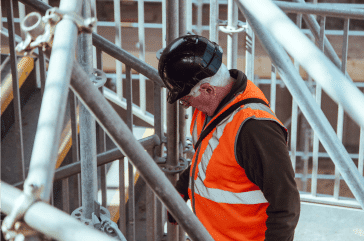The construction industry in Canada is bustling with new projects and developments. Amid such growth, it is essential for businesses and contractors to ensure that their projects run smoothly and securely. This is where Surety Bonds come into the picture. They provide an invaluable layer of protection for contractors, businesses, and property owners involved in construction projects. This article aims to educate readers about the various types of Surety Bonds available in Canada and their significance in the construction industry. We will also discuss how to select the right Surety Bond for your needs. With our expertise in the bonding and surety market, Approved Casualty is here to guide you through your surety bonding journey.
In the construction industry, Surety Bonds are an essential risk management tool ensuring that contractors and businesses adhere to the terms and conditions of a contract. They act as financial guarantees provided by a Surety Company that a contractor will fulfill their contractual obligations. In essence, they are an agreement between three parties – the principal (the contractor or business requiring the bond), the obligee (the party who requires the bond, such as a property owner or project developer), and the surety (the insurance company that guarantees the bond).
There are various types of Surety Bonds that serve different purposes in the construction industry, and it’s vital to understand which bond is suitable for your specific needs. Some of the most common types include bid bonds, performance bonds, payment bonds, and maintenance bonds. Each bond has a specific purpose and offers a different level of protection for the parties involved.
As the market trends evolve and construction projects become more complex, there is an increasing need for insurance agents to offer comprehensive surety bond coverage. That’s where Approved Casualty steps in to assist insurance brokers across North America in providing their clients with the right surety bonding and related insurance products.
In this article, we will dive deeper into the various types of Surety Bonds available in Canada, discussing their purpose, key features, and how they can boost the efficiency and success of your construction project. Stay tuned to delve into the world of Surety Bonds and discover how to find the ideal coverage tailored to your business’s needs.
Understanding the Different Types of Surety Bonds
Before we delve into the various kinds of Surety Bonds, it is crucial to grasp their primary purpose: providing financial guarantees to ensure that a contractor or business fulfills its contractual obligations. A Surety Bond is like a safety net, reassuring all parties that the project will proceed smoothly without any hitches. With that understanding, let us explore the four most common types of Surety Bonds in the construction industry:
- Bid Bonds: Bid Bonds protect project owners and developers by ensuring that contractors submit sincere bids. They ensure that if a contractor is awarded a project, they will honor the terms and conditions of their bid. Should the contractor fail to do so, the project owner can claim compensation from the Surety Company up to the bond amount. As a result, Bid Bonds safeguard project owners from the risks related to failed bids or wavering contractors.
- Performance Bonds: These bonds guarantee that a contractor will complete the construction project according to the terms and specifications outlined in the contract. Performance Bonds protect the project owner from financial losses if the contractor fails to deliver on their contractual obligations. In such cases, the Surety Company will either find another contractor to complete the project or compensate the project owner for the additional costs incurred.
- Payment Bonds: Payment Bonds ensure that contractors will pay subcontractors, suppliers, and laborers involved in the project. These bonds protect the project owner and all the project participants from financial losses due to unpaid bills or potential liens. If a contractor defaults on their payments, the Surety Company compensates the affected parties up to the bond amount.
- Maintenance Bonds: Maintenance Bonds protect project owners from defects or subpar workmanship during the maintenance period specified in the contract. In case any defects arise within the bonded maintenance period, the Surety Company will compensate the project owner for the repairs and additional costs.
Why are Surety Bonds Essential in the Construction Industry?
Surety Bonds play a crucial role in the construction industry, offering numerous benefits for all involved parties. Let’s take a closer look at their importance:
- Risk Management: Construction projects are rife with risks, from payment disputes to delays in completion. Surety Bonds serve as an essential risk management tool, minimizing the potential for financial losses and protecting all stakeholders involved in the project.
- Contractual Security: Surety Bonds act as a guarantee that contractors will fulfill their contractual obligations, ensuring smooth project completion and alleviating contractual disputes.
- Financial Stability: By safeguarding project owners from financial losses due to contractors’ failures or payment defaults, Surety Bonds contribute to the overall financial stability of construction projects.
- Boosting Confidence: Surety Bonds instill confidence in project owners and developers, as they can trust that the bonded contractors are financially capable and committed to executing the project as per the contract.
Selecting the Right Surety Bond for Your Needs
When choosing a Surety Bond, it is essential to consider the specific requirements and objectives of your construction project. Here are some tips to help you make an informed decision:
- Assess Your Risk: Begin by evaluating the potential risks for your project, such as the work scope, project location, and the financial capabilities of the involved contractors. Understanding these risks will assist in determining which type of bond offers the best protection for your project.
- Consult with a Bonding Specialist: Reach out to an expert, like Approved Casualty, for guidance on selecting the appropriate type of Surety Bond. Bonding specialists possess in-depth knowledge of the industry and can provide personalized advice based on your needs.
- Compare Surety Companies: Not all Surety Companies are alike. It is crucial to compare their financial stability, responsiveness, and track record before making a decision. Select a Surety Company with a strong reputation and established presence in the bonding market.
Conclusion
In the ever-evolving construction industry, Surety Bonds have become indispensable for safeguarding project owners, contractors, and other stakeholders. With various types of Surety Bonds available, it is crucial to select the one that best fits your construction project’s requirements. By partnering with a trusted wholesale intermediary like Approved Casualty, you can ensure a smooth, secure, and successful construction project.
Looking for reliable and customized surety bond insurance products? Look no further than Approved Casualty & Surety, your trusted wholesale intermediary and MGA in Mississauga. Contact us today to learn more and secure the protection your business needs.







